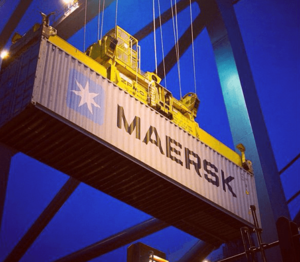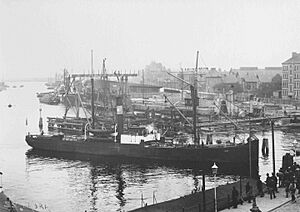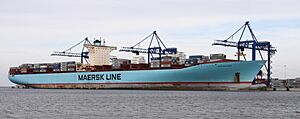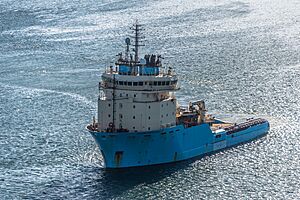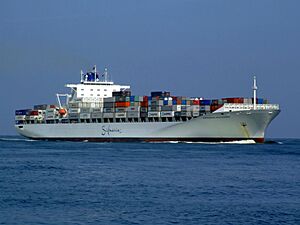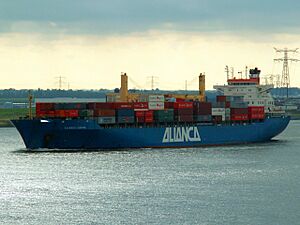Maersk facts for kids
 |
|
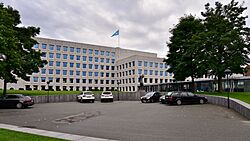
Maersk head office
|
|
| Aktieselskab | |
| Traded as |
|
| Industry | Freight transport |
| Predecessor |
|
| Founded | 16 April 1904, Svendborg, Denmark |
| Founders | Arnold Peter Møller Peter Mærsk Møller |
| Headquarters | Esplanaden 50,
1263 Copenhagen K
,
Denmark
|
|
Key people
|
Vincent Clerc (CEO) |
| Products | Container shipping and terminals, logistics and freight forwarding, ferry and tanker transport, semi-submersible drilling rigs and FPSOs |
| Revenue | |
|
Operating income
|
|
| Total assets | |
| Total equity | |
| Owner | Publicly traded |
|
Number of employees
|
108,160 (2024) |
| Subsidiaries | 900+ |
Maersk is a big Danish company that helps move goods all over the world. It was started in 1904 by Arnold Peter Møller and his father Peter Mærsk Møller.
Maersk does many things, like running ports, managing how goods move from one place to another, storing items in warehouses, and even flying cargo by air. The company is based in Copenhagen, Denmark. It has offices in 130 countries and over 100,000 employees around the world.
Maersk is a family business that is also publicly traded, meaning people can buy shares in it. The Møller family still has a lot of control over the company. In 2024, Maersk earned US$55.5 billion.
Contents
History of Maersk
The company began in April 1904 in Svendborg, Denmark. It was first called "Dampskibsselskabet Svendborg," which means "Svendborg Steamship Company." It was founded by Captain Peter Mærsk Møller and his son A. P. Møller.
A. P. Møller's son, Mærsk Mc-Kinney Møller, joined the company in 1939. He later became the head of the firm when his father passed away.
In 2016, Maersk decided to focus mainly on shipping containers. They sold off most of their oil and gas businesses. For example, Maersk Oil was sold in 2018, and Maersk Drilling became a separate company in 2019.
In 2017, Maersk was hit by a major computer virus attack called NotPetya. This caused big problems for their operations for several months.
Maersk is also working to be more environmentally friendly. In 2021, they bought eight ships that are designed to be carbon-neutral. In 2023, they introduced the Laura Mærsk, a ship that uses methanol as fuel. They also ordered more ships that can run on green fuels.
The Maersk Star Logo
The Maersk logo is a white, seven-pointed star on a light blue background. This star has a special meaning. It was first used in 1886 on Captain P. M. Møller's first steamship, the s.s. LAURA.
The story behind it is that Captain Møller's wife, Anna, became very ill during a sea trip. He prayed for her to get better, and she did. He later wrote to her, saying the little star on the ship's funnel was a reminder of that evening. It reminded him that the Lord hears prayers.
When the company was founded in 1904, the seven-pointed star became its symbol. It has been the main part of the Maersk logo ever since, though it has been updated a few times. The most recent changes were in the early 1970s.
Moving Goods Around the World
Maersk Line
Maersk Line is the biggest part of Maersk. It is one of the world's largest companies for shipping cargo across oceans. In 2013, it operated over 600 ships. By 2021, Maersk Line owned 17% of all container shipping capacity worldwide.
Maersk has some of the largest container ships ever built. The Emma Maersk, delivered in 2006, was the biggest at the time. Later, even larger ships called the Triple E-class were built. The first of these arrived in 2013.
In 2012, Maersk Line stopped doing business in Iran. This was to avoid problems with other countries that had sanctions against Iran.
APM Terminals
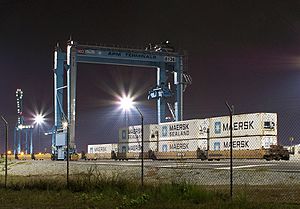
APM Terminals is a separate part of Maersk that runs ports and container terminals. They have interests in 57 ports and terminals in 36 countries. They also have 155 inland service locations in 48 countries. These terminals are important places where containers are loaded and unloaded from ships.
Some of the places where APM Terminals operates include:
- Africa: Abidjan, Cotonou, Luanda, Tangier
- Europe: Algeciras, Rotterdam, Valencia
- North America: Los Angeles, Miami, Port Elizabeth
- Latin America: Buenos Aires, Cartagena, Santos
- Middle East: Aqaba, Haifa, Jebel Ali
- Asia: Colombo, Qingdao, Singapore
Maersk Container Industry
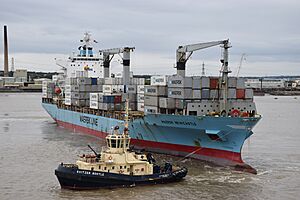
Maersk Container Industry makes containers. They have factories in China and their main office in Denmark. They also handle container repairs and sales.
Svitzer
Svitzer started in 1833 by helping ships that were in trouble. Later, they began towing ships. Maersk became the main owner of Svitzer in 1979. Today, Svitzer has over 400 tugboats and other vessels. They help guide ships in over 100 ports and 20 oil and gas terminals worldwide.
In February 2024, Svitzer became a separate company from Maersk. Its shares are now traded on the stock market in Copenhagen.
Damco
Damco used to be the name for Maersk's logistics services. It helped manage supply chains and freight forwarding. In 2019, Maersk decided to bring Damco's services directly into the Maersk brand. By the end of 2020, the Damco brand was no longer used.
Company Performance
In 2024, Maersk made €55.5 billion in revenue. The company had 108,160 employees that year.
| Year | Revenue in million € |
Net income in million € |
Total assets in million € |
Employees |
|---|---|---|---|---|
| 2015 | 30,769 | 791 | 62,408 | |
| 2016 | 27,646 | (1,939) | 61,118 | |
| 2017 | 31,189 | (1,205) | 63,227 | |
| 2018 | 39,257 | 2,985 | 62,690 | |
| 2019 | 38,890 | (84) | 55,399 | 80,000 |
| 2020 | 39,740 | 2,960 | 56,117 | 80,000 |
| 2021 | 61,787 | 18,170 | 72,271 | 95,000 |
| 2022 | 81,529 | 29,703 | 93,680 | 110,000 |
| 2023 | 51,065 | 3,954 | 82,578 | 100,000 |
| 2024 | 55,482 | 6,095 | 87,697 | 108,160 |
Former Energy Businesses
Maersk Oil
Maersk Oil was created in 1962 to explore for and produce oil and gas. It operated in places like the North Sea, Qatar, Algeria, and Kazakhstan. In 2008, oil and gas made up a large part of Maersk's earnings. However, in 2017, Maersk decided to sell Maersk Oil to a company called Total S.A. The sale was completed in 2018.
Maersk Drilling
Maersk Drilling provides special services to oil companies by operating drilling rigs. They own many rigs, including large jack-up rigs and drillships. These rigs help find and extract oil and gas from deep underground. In 2022, Maersk Drilling merged with another company called Noble Corporation.
Maersk Supply Service
Maersk Supply Service helps the offshore industry. They have a fleet of vessels that can handle anchors, tow drilling rigs, and supply platforms. In July 2024, it was announced that DOF Group would buy Maersk Supply Service.
Maersk Integrated Services
Maersk Line, Limited
Maersk Line, Limited (MLL) is a US-based part of Maersk. It owns and operates US-flagged ships. These ships provide transportation and logistics services to the U.S. Federal Government.
In 2012, Maersk Line paid fines to the U.S. government. This was after an investigation found that Maersk had overcharged the Department of Defense for transporting containers to Iraq and Afghanistan.
The Red Sea crisis, which started in late 2023, has affected shipping. Maersk estimated in May 2024 that this crisis caused a 15–20 percent loss in shipping capacity across the industry.
Former MCC Transport
MCC Transport used to handle container shipping within Asia. This company was later renamed Sealand-Asia.
Former Seago Line
Seago Line was a shipping line that served ports in the Mediterranean region. This company is now part of Sealand-Europe and Mediterranean.
Former Safmarine
Safmarine was a shipping company with strong ties to Africa. It operated many container and multi-purpose vessels. In September 2020, the Safmarine brand was brought into the main Maersk brand.
Former Sealand
SeaLand, also known as "Sealand – A Maersk Company," is an American shipping and logistics operator. It became part of Maersk in 1999. The Sealand name was stopped in 2009 but brought back in 2014. It later merged with other Maersk regional brands. In 2023, Maersk decided to combine all its brands, and the Sealand brand stopped existing in December 2023.
Maersk Global Service Center
Maersk GSC runs shared service centers that handle back-office tasks for the Maersk Group. These centers are in places like Chennai, Mumbai, Chengdu, and Metro Manila. New centers are opening in Mexico and Brazil.
Former South American Aliança
Aliança was a Brazilian company that operated container ships along the coast.
Ardent
Ardent Salvage is a company that helps with ship salvage, wreck removal, and marine firefighting. It was formed when Maersk's Svitzer merged with another company called TITAN Salvage. Ardent is based in Houston, Texas.
KGH
Maersk bought KGH in 2020. KGH provides customs and trade solutions in Europe, including customs broker services. The KGH brand is now part of Maersk Customs Services.
Maersk Training
Maersk Training offers special training for different industries. They provide courses for maritime, oil and gas, and wind power industries. Their main office is in Svendborg, Denmark, with other locations around the world. In October 2023, Maersk Training bought a Norwegian company called ResQ, which provides safety training.
Star Air
Star Air used to operate cargo aircraft, mainly for UPS in Europe. In August 2022, Star Air became part of Maersk Air Cargo.
In 2023, Maersk started a new air freight service with regular flights between Billund, Denmark, and Hangzhou, China. This was the first scheduled air cargo service between Denmark and Asia. In July 2024, Maersk received its first new Boeing 777F aircraft for this route.
European Rail Shuttle B.V.
In 2013, Maersk Line sold ERS Railways B.V. to Freightliner Group. ERS Railways B.V. is a company based in Rotterdam that transports cargo, mostly shipping containers, by train.
World Robot Olympiad
The World Robot Olympiad is a robotics competition held in Singapore. Maersk Oil used to be a main sponsor of this event.
Maersk and Climate Goals
Maersk is a very large company, and its operations produce a lot of carbon dioxide. In 2021, Maersk's emissions were 37 million tonnes. The company has announced plans to become CO2 neutral by 2040.
Even though international shipping emissions are not counted in Denmark's national climate targets, Maersk is working to reduce its impact. The company has set specific goals for 2030 and 2040 that have been approved by the Science Based Targets initiative (SBTi). These goals aim to align Maersk with a 1.5°C global warming limit.
In the past, there were concerns about pollution from ships, like sulfur dioxide (SO2) emissions. Ships used to burn heavy fuel oil, which released many pollutants. While filters can remove some of these, there have been debates about how to best manage this pollution.
Maersk and Tonnage Taxation
Denmark has a special tax system for shipping companies called "tonnage tax." This system means that shipping companies pay a fixed tax per ship, no matter how much profit they make. This is different from the regular 22% corporate tax that other companies pay. This tax system helps keep shipping companies in Denmark.
Maersk also benefits from a scheme that allows them to pay tax-free salaries to their crews. This lowers their labor costs, which acts like government support.
In 2021, Maersk made a record profit, but due to the tonnage tax, they paid a very small percentage of their profit in tax to Denmark. In 2022, their tax payment in Denmark was also very low.
Maersk has also worked to keep shipping exempt from a global minimum tax agreement. This agreement, adopted by 135 countries in 2021, aims to make sure international companies pay at least 15% in tax. However, the shipping industry was not included in this agreement.
Piracy Challenges
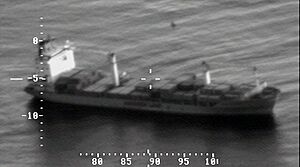
On April 8, 2009, the MV Maersk Alabama was hijacked by pirates off the Somali coast. The ship had 20 American crew members. This was the first time in over 200 years that Americans on a US-flagged ship were taken by pirates. The crew fought back and regained control of the ship. However, the pirates took the captain hostage for four days. On April 12, 2009, the US Navy rescued the captain, and three pirates were killed. This event was later made into the 2013 movie Captain Phillips, starring Tom Hanks.
Piracy costs Maersk a lot of money, around $100 million each year. This is because ships have to take longer routes and sail faster to avoid pirate areas, especially near East Africa.
NotPetya Cyberattack
On June 27, 2017, Maersk's computer systems were attacked by a computer virus called NotPetya. This virus was designed to look like a ransomware attack, but it was actually meant to cause major damage. The attack was carried out by a Russian military cyber group. It severely disrupted Maersk's operations for several months.
Wired magazine called it the 'Most Devastating Cyberattack in History.' Maersk had to rebuild its entire computer system in just 10 days. The company lost over US$300 million because of the attack.
See also
 In Spanish: A.P. Møller-Mærsk para niños
In Spanish: A.P. Møller-Mærsk para niños
- Top container shipping companies
- List of petroleum companies
- List of ships owned by Maersk
- Mask Off Maersk
 | Dorothy Vaughan |
 | Charles Henry Turner |
 | Hildrus Poindexter |
 | Henry Cecil McBay |


